
Dad Is Sick And Tired Of Constant Complaints From Picky-Eater Children, Figures Out A Way To Make Them Change Their Tune
If you’re a parent, there’s a good chance you’ve encountered some picky eating at one point or another. Perhaps your little one went through a phase of demanding only peanut butter and jelly sandwiches, macaroni and cheese or chicken nuggets. And that’s perfectly normal!
But when one dad found himself receiving complaints about dinner no matter what he chose to prepare, he decided that it was time to retire from cooking altogether. Below, you’ll find the full story, along with an update, that this fed-up father shared on Reddit, as well as conversations with Rachael Hartley, RD, LD and Jordan Thompson, RD, DDEPT.
This father was fed-up with his children complaining about dinner no matter what he chose to make
Image credits: Malte Helmhold (not the actual photo)
So he decided it was time to retire from cooking altogether
Image credits: cottonbro studio (not the actual photo)
Later, the dad shared an update on how his “retirement” went
Image credits: August de Richelieu (not the actual photo)
Image source: BabyHooey
He also responded to several readers and provided additional information on the situation
It’s perfectly normal for kids to go through a phase of picky eating
Image credits: Karo Kujanpaa (not the actual photo)
To learn more about picky eating and how common it is among children, we reached out to a couple of experts on the topic who were kind enough to provide their insight. Registered Dietician and Nutrition Therapist Rachael Hartley told Bored Panda that most children will go through a phase of picky eating, which is considered developmentally ‘normal’.
“This usually happens sometime between 2 and 4 years, and is thought to have roots in human evolution, a protective mechanism at a time when children are weaning away from their patients, becoming more independent and more at risk for accidentally ingesting something that is potentially harmful. It may also be part of how a child seeks a sense of control,” she explained.
Registered Dietician Jordan Thompson, of JM Nutrition, also added that, “It can be common for multiple children in one family to become picky eaters. Children learn through observing and may copy the behavior of their siblings. They may mirror their parents too.”
But Rachael reassures parents that most children will grow out of picky eating, “especially if they are given access to a wide variety of foods, not pressured to eat things they don’t like, and have had parents modeling eating a variety of foods.” However, this isn’t the case for everyone. “Some may be more selective with food due to their neurodivergence and experience difficulties with certain textures or tastes,” she explained.
“As parents, it is your role to decide what, when, and where meals are offered; and children decide if and how much they would like to eat”
“While with support, they may be able to expand their palette, they will likely always be more selective around food and that’s okay!” Rachael added. “If a child is a more selective eater, especially if it is to the point where it’s impacting the child or the parents quality of life or ability to adequately nourish themselves, it’s worth seeking professional support.”
When it comes to cooking strikes, Jordan shared that she actually has heard of parents taking this route before. “I find this happens when there are multiple picky eaters in the family and parents get frustrated trying to accommodate everyone’s food preferences,” she explained. “Although this may seem like a reasonable option, I do not recommend it. Children are still learning how to eat and often do not have the skills or knowledge that is needed to prepare nutritious, well balanced meals. As parents, it is your role to decide what, when, and where meals are offered; and children decide if and how much they would like to eat.”
As far as what the experts do advise for parents who have picky eaters, Rachael told Bored Panda, “I encourage [them] to mostly cook the foods they want to eat, as long as there are some ‘safe foods’ available, and when there’s not excessive pressure or becoming a short order cook, often times children will come around to trying more foods.”
Jordan shared some of her top tips as well. “Prepare one meal for the entire family and avoid making separate meals when or if your child refuses to eat,” she says. “You can include at least 1 food you know your picky eater enjoys, so that there is something on the plate they will eat.” She notes that it can also be helpful to get your children involved in meal preparation and cooking more regularly. “Children may be more likely to try foods they help make,” Jordan notes. “This will help them to learn about food and gain the skills necessary to prepare balanced meals as they get older.”
“Make a variety of foods available, present them in a low pressure way, and create the space for your children to try them on their own timeline”
Image credits: Kelly Sikkema (not the actual photo)
“Offer balanced meals and snacks, and let your child decide if and how much they would like to eat,” Jordan went on to recommend. “Children are more likely to enjoy food when eating is their own choice. Avoid using bribes, punishments, or rewards to get them to eat as this can lead to negative feelings about eating. Try offering meals family style where your child can choose what foods they would like to put on their plate. Eat meals as a family as often as you can. Children learn by observing; during family mealtimes, parents and other children (i.e., siblings) can model good eating behavior for your picky eater.”
And according to both experts, patience is certainly a virtue when it comes to parenting picky eaters. “Parents can feel extremely anxious when their child isn’t eating a lot of different foods, especially if those foods are ones they consider healthy, like fruits or vegetables,” Rachael added. “Try not to pressure children too much, as it often backfires and sends the message that these foods are a chore. Make a variety of foods available, present them in a low pressure way, and create the space for your children to try them on their own timeline.”
“Eating is a learned skill, and children might not like a food the first time they try it,” Jordan shared. “Offer foods multiple times and try to be patient to allow your child time to explore new foods. It can take 15 or more tries before a child accepts a new food.”
We’d love to hear your thoughts on this story in the comments below, pandas. Then, if you’re interested in checking out another Bored Panda article discussing a parent who taught their child a lesson when it comes to food, we recommend reading this piece next!
Readers applauded the father for his creative approach to picky eating
Some even shared similar stories of lessons they and their family members have learned
Not a healthy mentality. It's one thing to make your kids understand they shouldn't be exaggerately picky when it comes to food but a kid shouldn't be left hungry if they don't like to eat something. It never changed my mind to eat something if I really didn't like it and I had an aunt that would leave us starving. It's not cool
Load More Replies...My way of dealing with likes, dislikes, allergies and intolerances, was to make separate components, and let people assemble their dinners on their own plates. Eg chicken curry would have cooked chicken piece, the curry sauce, a dish of rice, and a couple of plates of veggies. People could choose what they wanted. We would have pizza on a Saturday night. I'd make the dough, and put it on baking sheets. Beside the dough was the tomato sauce, cheeses, and an array of toppings to choose from. The family would assemble their own pizza.
Not a healthy mentality. It's one thing to make your kids understand they shouldn't be exaggerately picky when it comes to food but a kid shouldn't be left hungry if they don't like to eat something. It never changed my mind to eat something if I really didn't like it and I had an aunt that would leave us starving. It's not cool
Load More Replies...My way of dealing with likes, dislikes, allergies and intolerances, was to make separate components, and let people assemble their dinners on their own plates. Eg chicken curry would have cooked chicken piece, the curry sauce, a dish of rice, and a couple of plates of veggies. People could choose what they wanted. We would have pizza on a Saturday night. I'd make the dough, and put it on baking sheets. Beside the dough was the tomato sauce, cheeses, and an array of toppings to choose from. The family would assemble their own pizza.

 Dark Mode
Dark Mode 

 No fees, cancel anytime
No fees, cancel anytime 






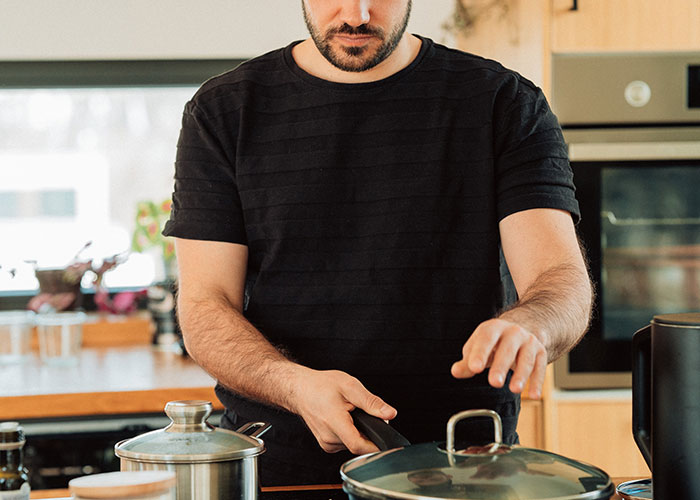
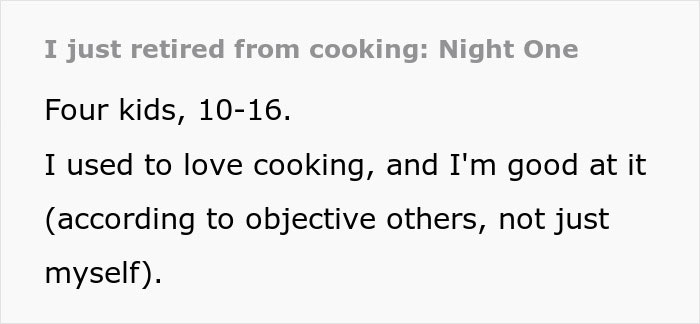

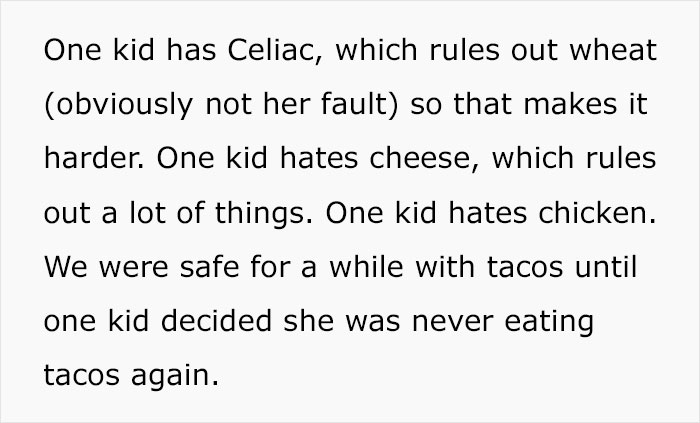



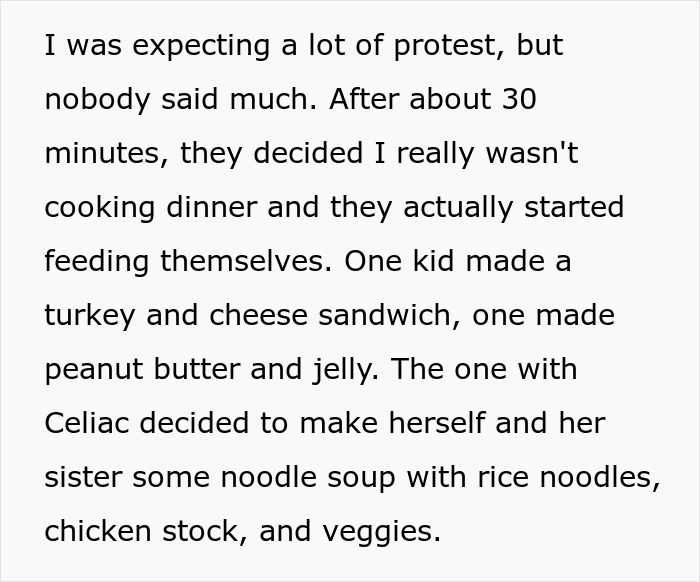

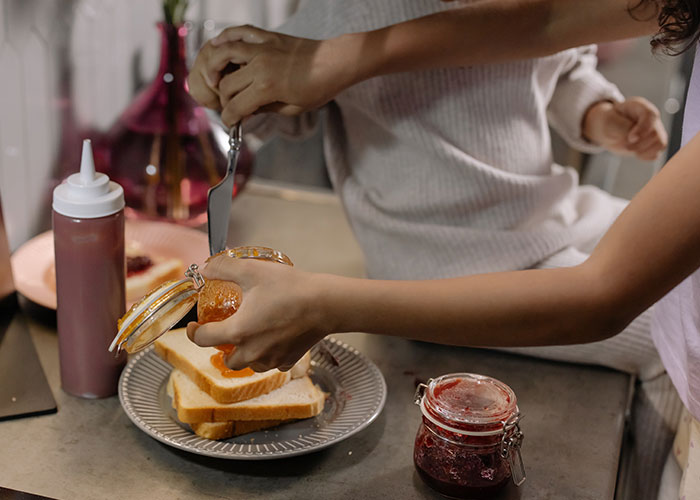

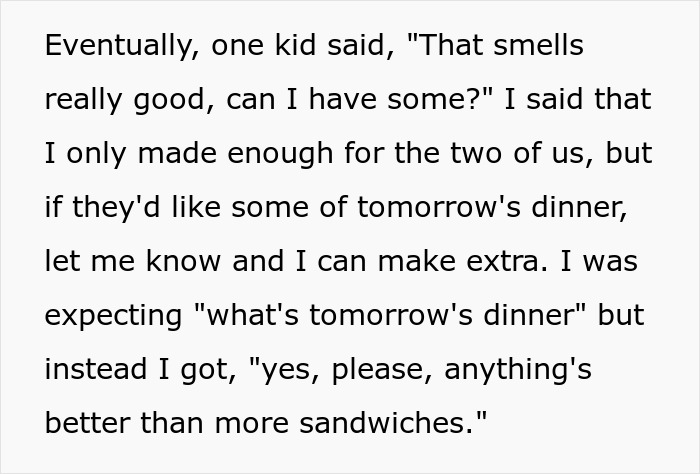

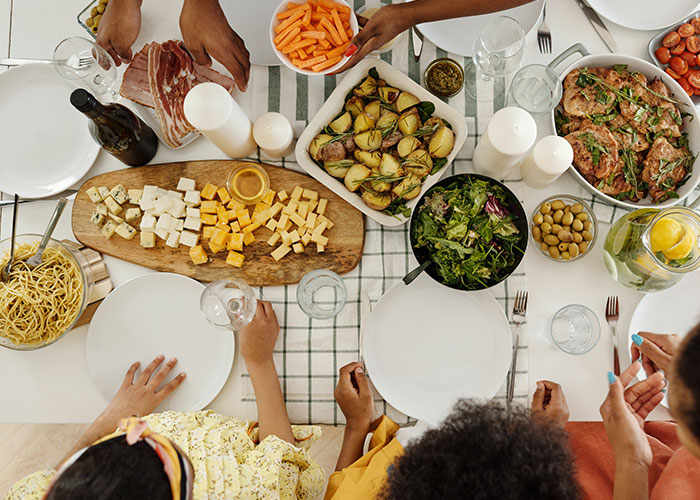

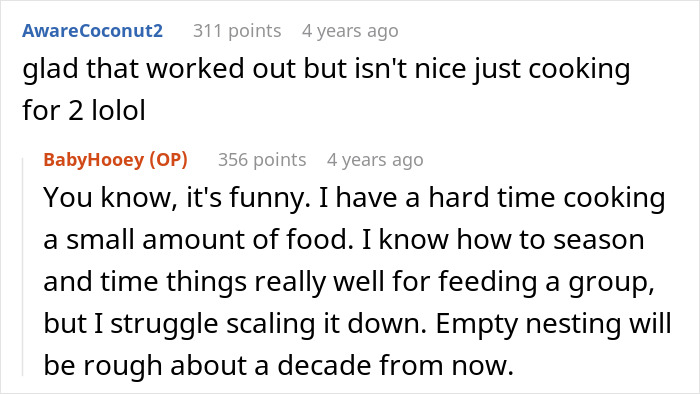
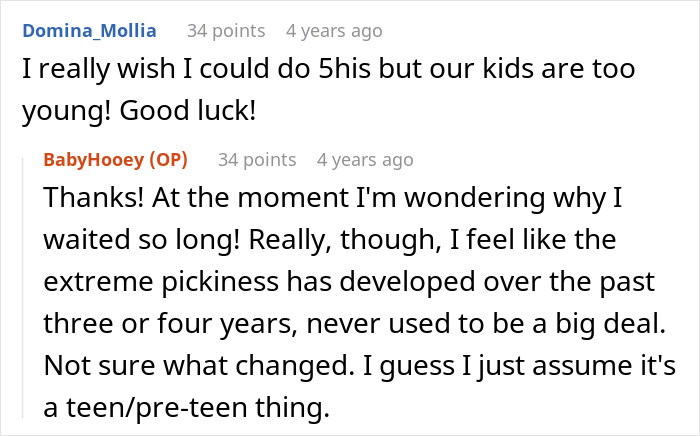
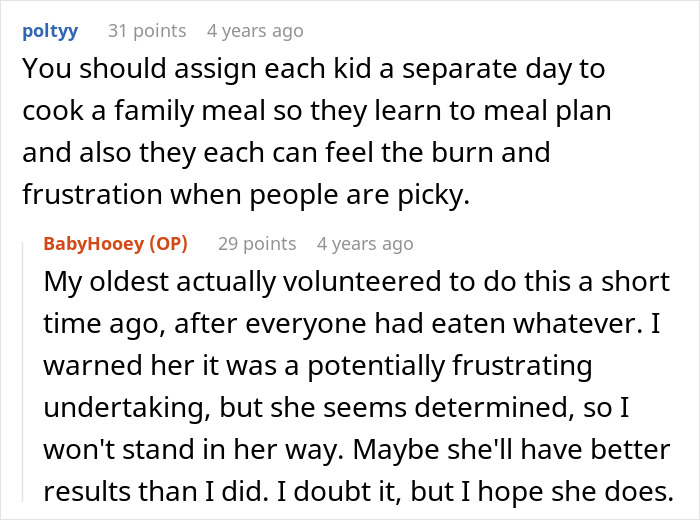
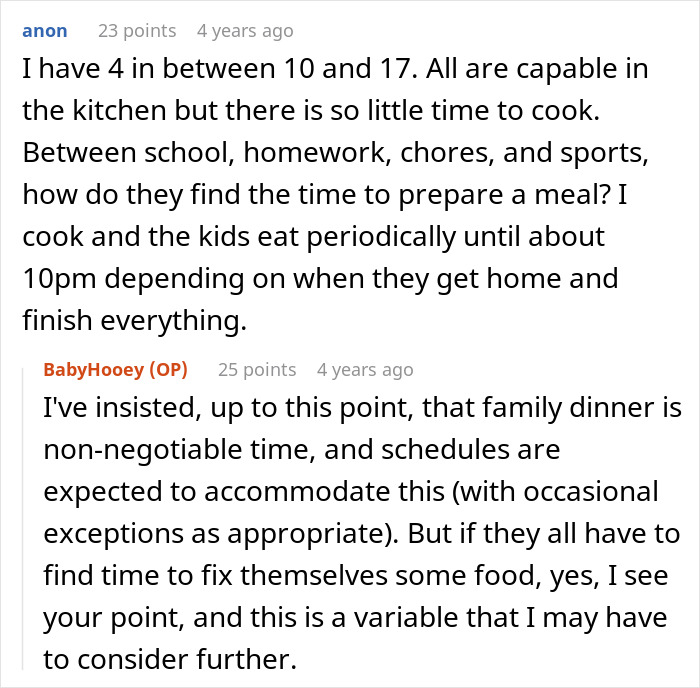

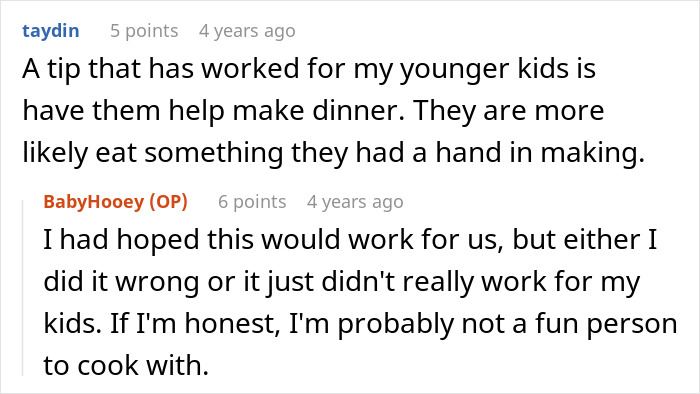
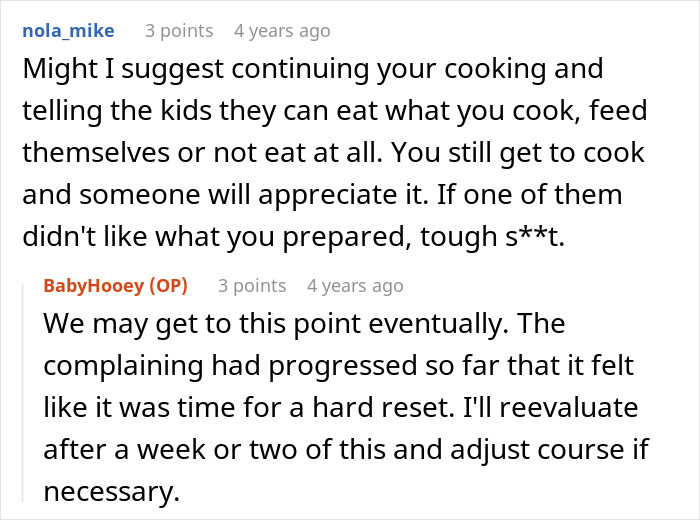
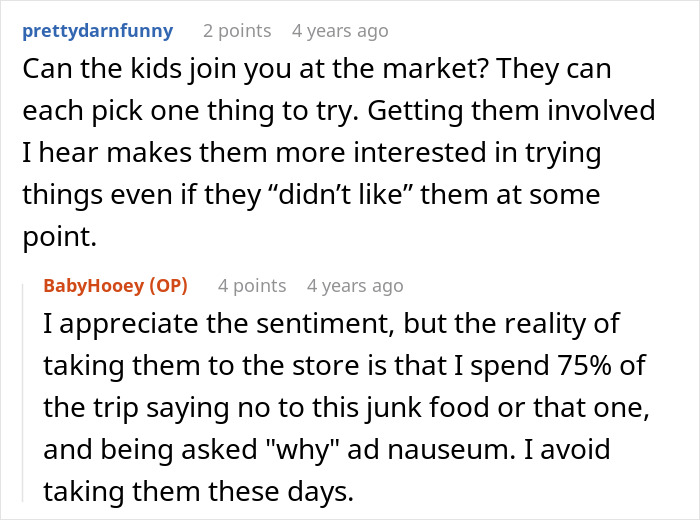



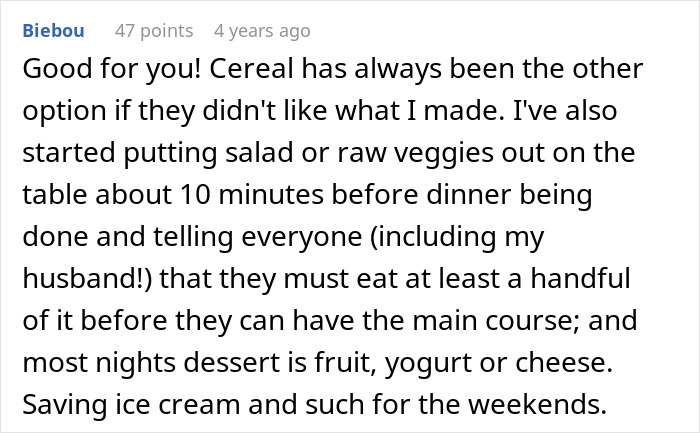
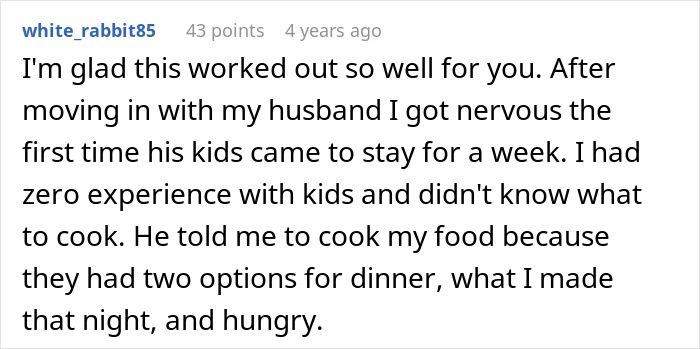




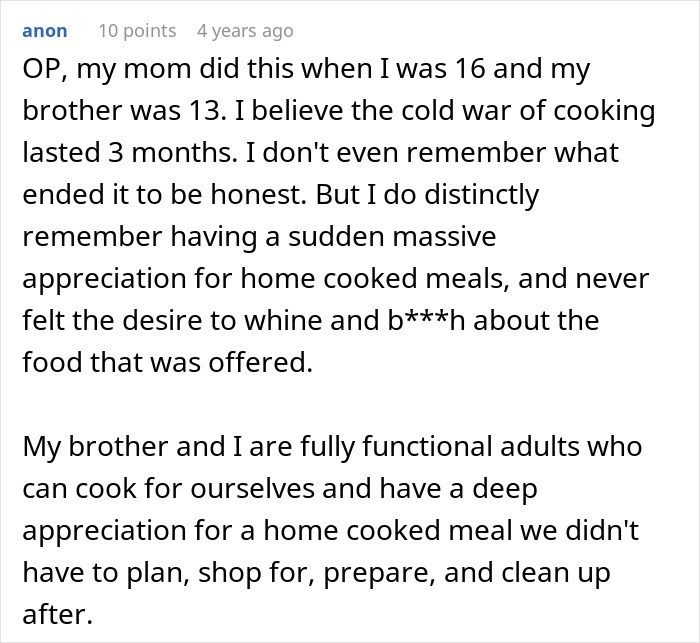
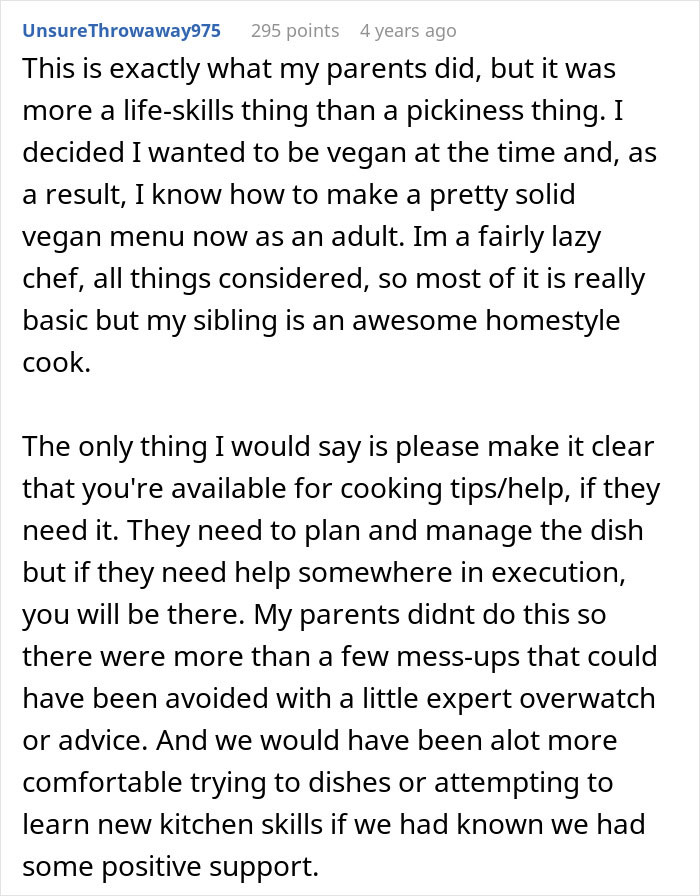
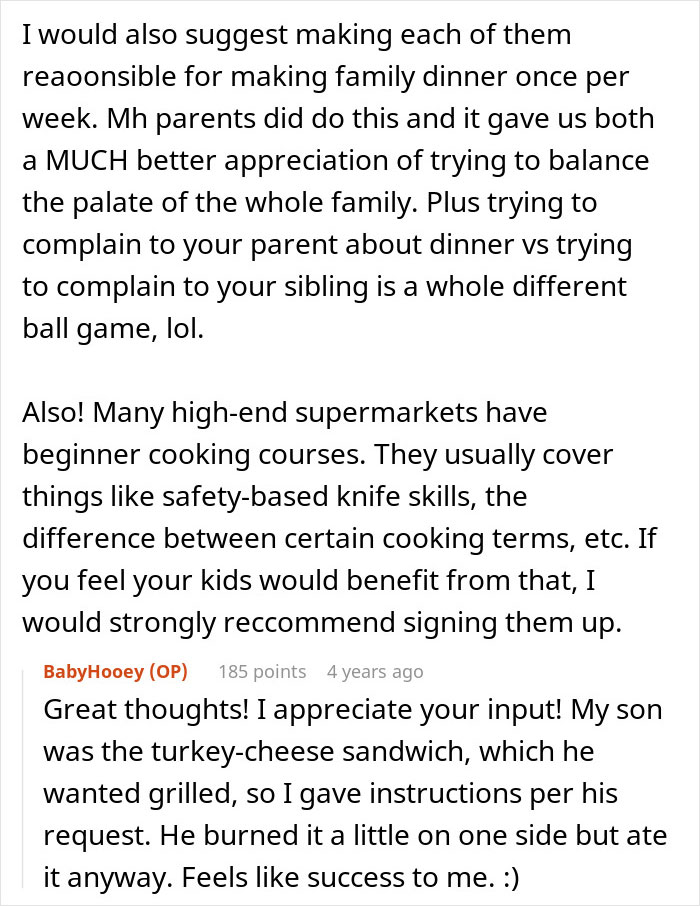
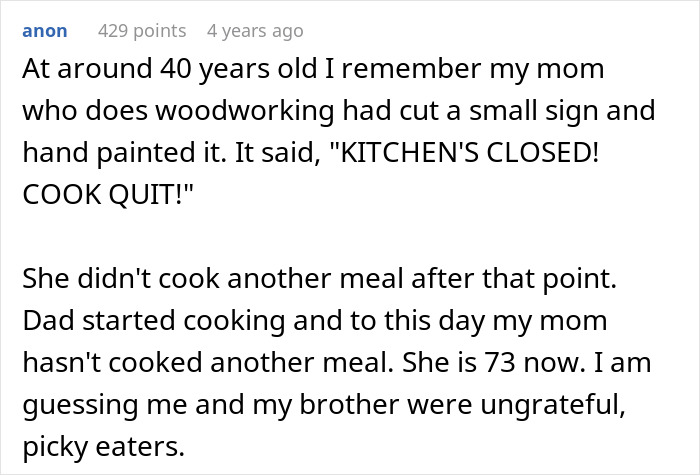

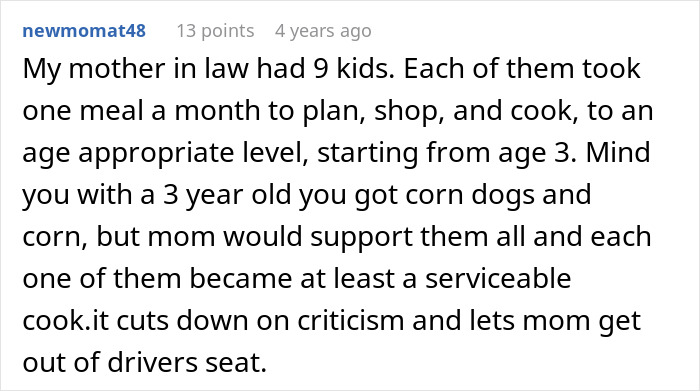
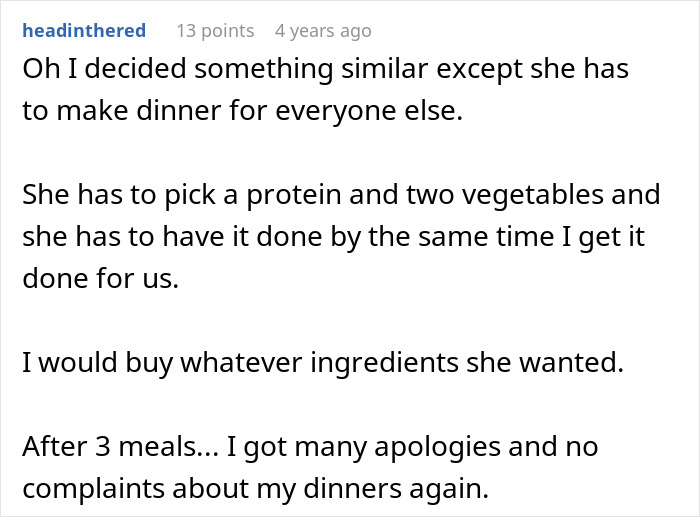
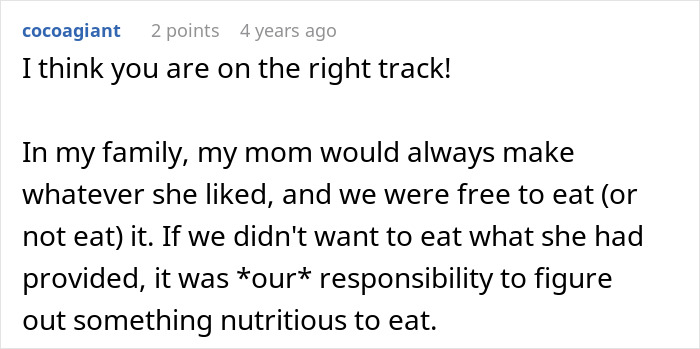












































118
48